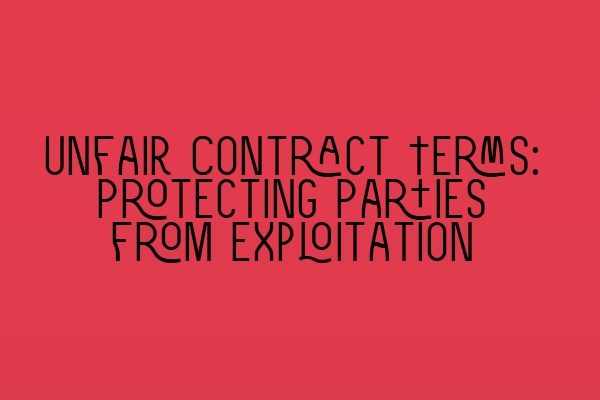Unfair Contract Terms: Protecting Parties from Exploitation
Welcome to the SQE Contract Law blog, where we provide valuable insights into the field of contract law. In this article, we will explore the concept of unfair contract terms and how they can potentially exploit parties involved in a contract. We will discuss the importance of protecting parties from such exploitation and provide key insights into this crucial aspect of contract law.
The Essence of Contract Law
Contract law is the foundation upon which business transactions are built. It provides individuals and businesses with a framework that governs their legal relationships and obligations. Contracts are meant to ensure that both parties receive the benefits they have agreed upon.
However, within the realm of contracts, there are instances where one party may have more bargaining power and can potentially take advantage of the other party. This is where unfair contract terms come into play.
What are Unfair Contract Terms?
Unfair contract terms refer to clauses or provisions in a contract that give one party an unfair advantage and exploit the other party. These terms can be found in various types of contracts, including consumer contracts, employment contracts, and business-to-business contracts.
Such terms often occur when one party has significantly more power and influence than the other, leaving the latter party in a vulnerable position. Unfair contract terms can take many forms, including but not limited to:
- Excessive cancellation fees
- One-sided indemnity clauses
- Unreasonable limitations of liability
- Unfair payment terms
- Unilateral variation clauses
These terms can lead to serious imbalances in the parties’ rights and obligations, resulting in exploitation and potential harm to the disadvantaged party.
Protecting Parties from Exploitation
The law recognizes the need to protect parties from unfair contract terms. Various legal frameworks and regulations have been established to address this issue and ensure fair treatment for all parties involved.
An example of such legislation is the Consumer Rights Act 2015 in the United Kingdom. This Act provides safeguards for consumers against unfair contract terms in consumer contracts. It renders unfair terms unenforceable, allowing consumers to challenge and seek protection from exploitative clauses.
Similarly, employment legislation, such as the Employment Rights Act 1996, protects employees from unfair contract terms imposed by employers. These laws aim to level the playing field and prevent the abuse of power by protecting the weaker party.
It is crucial for individuals and businesses to understand their rights under these laws and seek professional legal guidance to ensure they are protected from potentially unfair contract terms.
Challenging Unfair Contract Terms
If you suspect that a contract term you have entered into is unfair, it is essential to seek legal advice promptly. Professional contract lawyers can help you navigate the complexities of contract law and determine the legality and enforceability of the terms.
They will analyze the contract, assess the fairness of the terms, and guide you through the process of challenging unfair contract terms. Whether you are a consumer, an employee, or a business owner, understanding your rights and taking appropriate legal action is crucial to protect your interests.
Conclusion
Unfair contract terms can significantly impact the fairness and integrity of contractual agreements. Recognizing and challenging such terms is essential for safeguarding the interests of all parties involved.
At SQE Contract Law, we understand the importance of fair and balanced contractual relationships. We provide expert legal services to help individuals and businesses navigate the complexities of contract law and ensure they are protected from exploitation.
For further reading on related topics, we recommend exploring the following articles:
- Exploring the Impact of Frustration on Contractual Obligations: Legal Insights
- Interpreting Contractual Clauses: Unlocking the Hidden Meanings
- Legal Aspects of Business Contracts: Key Considerations for Entrepreneurs
- SQE Contract Law vs. Traditional Qualifications: A Comparative Analysis
- Agreements in Contract Law: Understanding Its Various Types
Thank you for reading. For any contract law-related inquiries, feel free to contact SQE Contract Law for expert advice and assistance.
